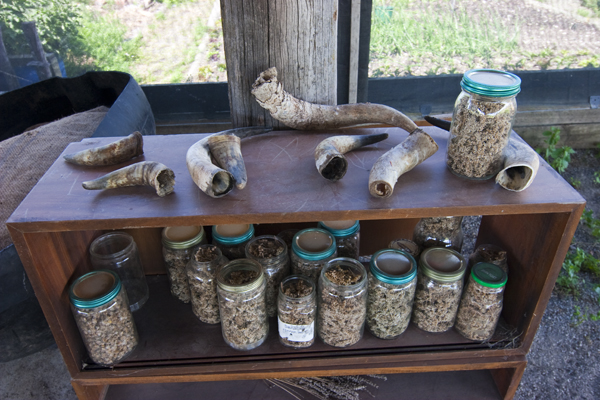The Vatican of biodynamic viticulture in New Zealand has to be Seresin Estate where I spent yesterday afternoon. It is owned by Michael Seresin, a Wellington lad who moved to Italy in the 60s and became a cinematographer (“Midnight Express,” “Angela’s Ashes,” “Harry Potter and the Prisoner of Azkaban”). The life as an ex-pat in Italy is important in this story because when Michael started Seresin Estate in 1992, he wasn’t just interested in growing grapes and owning a winery—he wanted that whole Italian grow-olive trees-fruit trees-organic-vegetable-gardens thing. And since he has been a vegetarian and, as he says, “organically inclined,” most of his life, it made total sense to establish an estate that not only grew grapes and Tuscan olive trees but used chickens for pest control and compost for fertilizer.
As Colin Ross, the estate manager, told me as we walked around the vineyards where chickens wandered up and down picking bugs out of the high grasses, “We’re organic because that’s the way Michael lives his life. It’s like an Old World estate. Michael is trying to inoculate the New World with Old World aesthetics.”
Well, okay, I’m on board for all of that. But then we had a look at the biodynamic part of the business and that’s where they lost me. We started at a little compound by the chicken roosts. A number of brick-lined pits had been dug into the ground. Some were covered in burlap, others were open. Above one was a chicken wire-lined crate, about two-by-two-by-two, filled with thousands of broken brown organic chicken eggs that could be lowered into the pit. On a nearby table were a dozen cow horns and a makeshift bookcase held dozens of quart-size Mason jars full of dried herbs: camomile, yarrow, dandelion flowers, stinging nettle.
Colin explained to me how the herbs were dumped into the various pits where they would ferment and get yucky (between the chicken coops and the fermenting pits, the compound smelled horrible in the heat) and eventually be stuffed into the deer bladders that, looking like used inflated condoms, were hanging on some twine in the shade, or the cow horns.
Eventually we made our way into the building where the wine is made only now the tanks were filled with this rather stinky composting tea made from all of these strange ingredients. “Of course, when we get done fermenting the compost tea, we have to thoroughly clean the tanks before we pump in the grape juice,” Colin said.
I don’t know. There are so many strange things that humans do so if Michael Seresin thinks he’s going to get better wine by fermenting yarrow and stuffing the dregs into a deer bladder that is then used like some sort of foul tea bag to make some sort of nasty concoction that he then spreads on his vines to make them grow better grapes (and keep the buggies away), well, who am I to say he’s crazy. After all, I grew up convinced that a man named Jonah lived inside a whale for three days and that if you didn’t eat meat on Fridays, you’d go to heaven. So I say What the hell—go ahead and bury your cow manure-stuffed horns in the vineyards if it makes you feel better.
Tags: Marlborough, New Zealand


Recent Comments